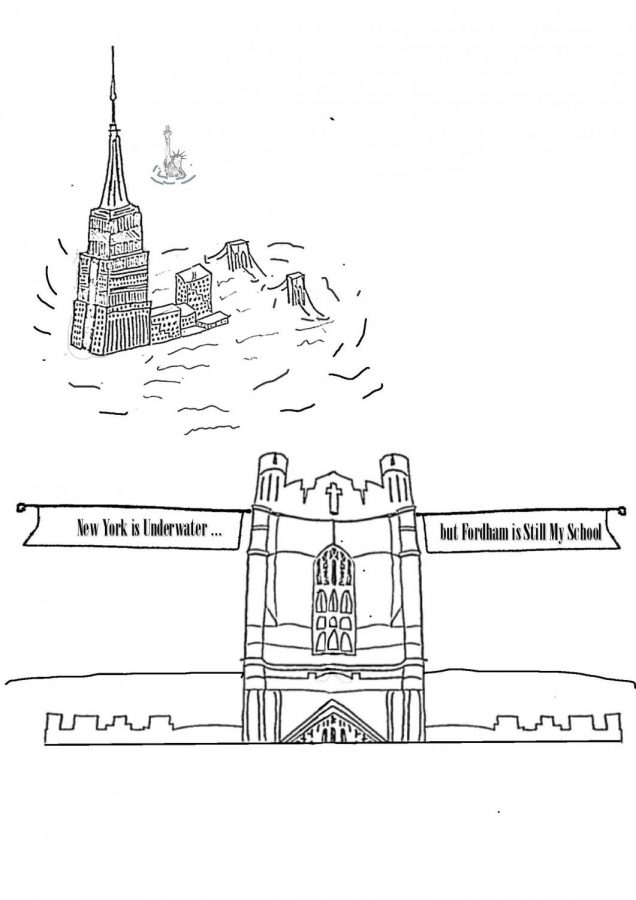Climate Change Will Save Fordham’s Rankings
December 2, 2019
For years, Fordham has struggled with its slipping spot in the U.S. News & World Report rankings. Indeed, over the past seven years, Fordham fell a total of 21 places, from a rank of No. 53 in National Universities in 2012 to its current place at 74. Fordham is tied with Stevens Institute of Technology in Hoboken, New Jersey, for Ignatius’ sake.
The Rev. Joseph M. McShane, S.J., has fought valiantly against this trend for years, most recently announcing in a university-wide email increased pressure on the “Retention Task Force” to increase Fordham’s retention and graduation rates, as well as the hiring of a new communications team that will “get the news (out) about the University’s accomplishments.”
Further prodding led McShane to admit that such “accomplishments are unfortunately in short supply,” though he cited the installation of five new chairs in the second floor of Lowenstein as one cause for celebration, and getting the meal exchange program to function in Schmeltzer as another.
But what if, instead of attempting to change the ever-dubious Fordham retention rate, there was a much simpler and less expensive way to save Fordham’s rankings?
Yes, I am talking about the catastrophic and potentially irreversible alteration of both local and global temperature and weather patterns on the face of our bountiful Mother Earth due to direct interference with the natural order by humankind, a phenomenon colloquially referred to as “climate change.”
When it comes to the U.S. News rankings, climate change and the accompanying rising sea levels will level — or rather, submerge — the playing field, guaranteeing Fordham a significantly higher spot in the rankings. I have verified this myself: on a particularly procrastination-filled night, instead of studying for chemistry, I checked the average elevations at each of the 73 colleges ranked higher than Fordham, and found that a simple sea level rise of 82 feet would ensure Fordham a ranking of around No. 37. NYU would be wiped out by a mere rise of 42 feet, though unfortunately, Columbia sits at a higher elevation. However, we Fordhamites would easily survive longer than those wimps in a climate change-racked Manhattan, thanks to the endurance that comes from surviving the bumpy back seat of a Ram Van, eating the oddly greenish eggs in the dining hall and taking that one EP3 class where participation is 75% of the total grade.
More than just our rankings would benefit from the rising sea levels accompanying climate change. The Fordham Lincoln Center (FLC) tunnels, after being flooded by the rising tides, would offer a perfect spot for the development of an FLC faction of the Fordham Swimming and Diving team (no, I didn’t know we had one of those either). Just imagine the exciting races as one of our own athletes makes the difficult swim from the Law School entrance all the way to the Lowenstein elevators in mere minutes.
Speaking of aquatic travel, Ram Vans would obviously need to be abandoned, to be replaced by a fleet of boats, which I propose we name “Goat Boats.” A boat sailing straight as the crow flies would also significantly cut travel time between campuses. In other words, several areas of campus life would be improved by climate change, and would certainly help McShane find some of those “accomplishments” he mentioned.
How should we bring about this rise in both sea levels and rankings? Well, we can certainly just continue along our current path — throwing plastic bottles into the wrong one of those three color-coded trash cans, leaving the water running or the lights on when we don’t need to, not reusing the printouts that, after waiting at the Quinn Library printer for half an hour, come out completely wrong and not supporting candidates who will actually pressure corporations to reduce emissions, instead of simply retaining the status quo.
And honestly, I’m sure McShane has already realized this and begun implementing pro-climate change measures, considering the number of Fordham monogrammed coffee cups and napkins wasted and thrown out every day, not to mention the amount of bad Aramark food half touched and thrown away in disgust. Perhaps even the leaking McMahon ceilings are McShane’s way to prepare us for the coming anthropocene.









